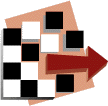|
LIFE ON THE
SCREEN
Identity
in the Age of the Internet
by Sherry Turkle
Simon and Schuster,
1995
ISBN 0-684-80353-4; $25.00; 347 pages
Reviewed by:
Cynthia Haynes, Ph.D.
The University of Texas at Dallas
School of Arts and Humanities
PO Box 830688-Mail Station JO31
Richardson, Texas 75083-0688
972-883-6340, 972-883-2989 (FAX)
Email: cynthiah@utdallas.edu
WWW: http://www.utdallas.edu/~cynthiah/
|

|
Teaching writing has never been more exciting as
Internet-based computer classrooms enable us to change the faces of
our pedagogies, while at the same time casting our students' and our
own identities headfirst into the fluid stream of digitized worlds.
Writing instruction has taken a giant evolutionary step onto a
landscape where amphibious cultures keep one foot in the Real world and one
foot in the Virtual world. Among the many learning environments in
which students discover new forms of writing and new ways to
interact, virtual communities like those described in Sherry Turkle's
Life on the Screen are challenging teachers to learn more about these
worlds in order to stay in step with the globalization,
democratization, and demystification of knowledge that students face
both in and out of higher education. This review aims to explore how
Turkle's fascinating technosocial research takes the complexities of
our digital era "to the streets" with a balanced perspective that
makes other extreme treatments of digital cybercultures (both
technophobic and technomanic) pale in comparison.
At the heart of Turkle's argument is an
in-depth examination of how technology (specifically computers,
computer interfaces, and online communities) disrupts our modernist
assumptions about identity and the 'Self,' a continuation of the
groundbreaking research in her first book, The Second Self (Simon
& Schuster, 1984). Turkle succeeds in negotiating through complex
contexts for the Self by drawing on resources and research in
psychology, sociology, psychoanalysis, and philosophy (among others).
The book is organized well as Turkle navigates (and transgresses) the
murky theoretical waters of aesthetics, artificial intelligence, and
virtuality and the effects each paradigm has on identity. Moving from
the broadest assumptions of a modernist aesthetic view of a core
(centered) Self to the more fragmented, yet fluid, postmodern view of
fragmented (decentered) Selves, her research resonates with similar
arguments in our own fields of rhetoric, composition, and electronic
pedagogy.
Lester Faigley's Fragments of Rationality and Richard Lanham's The Electronic Word
represent just two recent examinations of similar issues that have
sparked much debate among compositionists about identity and the
intimate relation it maintains with writing. In her first section,
"The
Seduction of the Interface," Turkle
sets up a familiar dichotomy in order to distinguish for her readers
how identity issues online differ from traditional f2f
(face-to-face). Like Lanham, Turkle ascribes much of the new identity
to a shift from a modernist aesthetic to a postmodernist aesthetic,
though Lanham uses the rhetorical and philosophical opposition as his
hermeneutic framework. And like Faigley (who meticulously traces the
effects of postmodernism on composition theory and pedagogy), Turkle
deftly and thoroughly historicizes the relations we have to our
computers and to those we meet through them in the next section,
"Of
Dreams and Beasts." Finally, she brings
all of this research to bear on computer-mediated identity relations
(playful and serious, ethical and political) in "On
the Internet."
Life on the Screen is not a book for the techno-faint-of-heart. It
will confirm some of our administrators' worst nightmares about the
Internet, and it spins the kind of tales that could spark what Turkle
calls "parental panic." It does, however, render identity in the age of the Internet one of the most significant conceptual sites of
struggle in our eternal wrestling with the narcissistic (and
existential) question in us all--who do we see "as we
catch sight of our images in the mirror of the machine." Turkle
portrays the question in all its stark contrasts, from inside our
deepest fears, and with a most compelling curiousity, and her answers
point us to a startling conclusion--Life is
also "on the screen."
 Return to PaperText Reviews Collection
Return to PaperText Reviews Collection
 Respond to Kairos Interactive
Respond to Kairos Interactive
